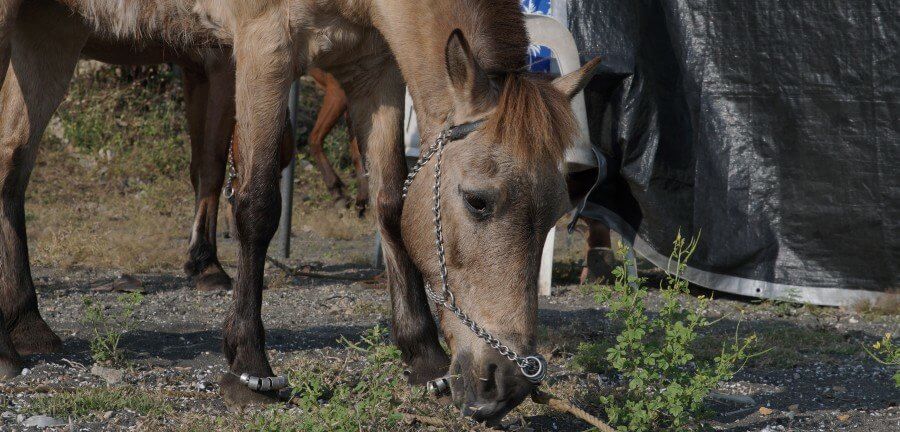After the Taal volcano in the Philippines spewed hundreds of tons of suffocating ash and sent lava streaming down its sides, PETA Asia was the first charity on the scene, and staffers are working to help as many animals as possible in the evacuation zone, providing food, water and veterinary care to dogs and cats who’ve been abandoned or taken to evacuation centers. We’ve done food drops, and one of our staffers had a four-hour meeting with the government trying to coordinate a rescue plan.
Taal is a tourist destination, and travelers flock to the picturesque area and rent horses to ride to the summit of the volcano. Now that the volcano is active, everyone living in the area has been ordered to evacuate, and countless animals have been left behind, including the horses.
These at-risk animals are precisely why we ask tourists never to ride an animal when vacationing. Long after a traveler is back home with memories and anecdotes, the horses, donkeys, camels and other animals forced to give rides to tourists around the world are still in harm’s way.
Taal authorities believe that all the animals who were in the area immediately surrounding the volcano have likely died. It’s an especially painful possibility for PETA Asia staffers, who have been working for years to improve conditions for the island’s animals, especially the horses forced to haul tourists to the summit.
Long before the volcano erupted, a team of PETA Asia staffers, veterinarians, assistants, veterinary students and volunteers as well as a farrier had been conducting clinics to provide care. Clinic staff treated horses with severe injuries, including one who couldn’t walk because of a huge laceration on her leg. Most horses needed fundamental care such as vaccinations (for rabies and tetanus, which is very common on the island), deworming, parasite control and wound care, among many other issues. They were also treated for saddle sores and thrush, and most needed to have their hooves trimmed and teeth filed.
Abuse and neglect go hand-in-hand when animals are treated as beasts of burden. A recent PETA Asia investigation in Jordan’s “Lost City” of Petra, for example, documented the entrenched suffering of more than 1,300 horses, donkeys, mules and camels who are forced to carry tourists or pull carriages every day. Handlers routinely whip and beat the animals during grueling treks through the ancient city in the sweltering heat, and there’s no water or shade for them, either.
Conditions are similar in the Havasupai region of the Grand Canyon. Horses and donkeys used to transport tourists or their gear to Havasu Falls are routinely starved, beaten, overloaded, whipped, kicked and forced to work while injured. Horses often collapse. And in Egypt, PETA Asia documented the plight of horses and camels, even those with painful, bloody wounds, who struggle in the sweltering heat to carry tourists in Giza and Luxor.
The situation in Taal is immediate and dire and in constant flux, but we’ve saved some of the animals, including a stray dog named Palakatik, who recognized us when our boat pulled up and came running! There were a lot of happy tears amidst the grief.
But while options are limited while a volcano is active, every single tourist can make a difference by refusing to force any animal to provide a ride, wherever rides are offered, including horse-drawn carriages in Nassau and New York City, elephant rides in Thailand’s scam “rescue” camps or Santorini’s donkey and mule caravans. When you take that ride, animals suffer and die.
This article was written by Jason Baker, PETA Vice President of International Campaigns.





